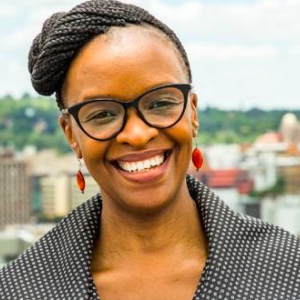OPINION | Abigail Noko: We are all human, we are all equal

While South Africa now enjoys equal democratic rights, the country still grapples with the challenges of poverty, inequality and unemployment.
This year on 10 December, we celebrate the 25th anniversary of South Africa's globally revered Constitution. Founded on the values of equality, human dignity and freedom, the signing into law of South Africa's Constitution marked a decisive break and a new chapter for the country, following a long history of colonialism and oppression. 10 December is also International Human Rights Day, which marks the adoption of the Universal Declaration of Human Rights in 1948.
In a society characterised by inequality and discrimination, we all lose. In one defined by non-discrimination and equality, we all win.
Article one of the Universal Declaration of Human Rights states that:
"All human beings are born free and equal in dignity and rights".
This principle of equality – that we are all human and all equal - is at the heart of human rights and the theme for this year's International Human Rights Day.
On this International Human Rights Day and the 25th anniversary of the South African Constitution, South Africa should celebrate its achievements and candidly assess the challenges that lie ahead.
Challenges still abound
While South Africa now enjoys equal democratic rights, the country still grapples with the challenges of poverty, inequality and unemployment - a continued legacy of apartheid and colonialism. And now, the Covid-19 pandemic has deepened these existing inequalities and created new vulnerabilities. South Africa is not alone in facing the challenge of building back better in the wake of the pandemic – the World Bank estimated that around 97 million people would remain poor in 2021 due to Covid-19.
Despite these persistent challenges, strides made in South Africa prior to the pandemic demonstrate that the country possesses a rich arsenal of human rights-based tools with which to recover and build back a more resilient and substantively equal society.
The fallout from the pandemic has shone new light on the importance of tackling inequality and discrimination in order to build resilience to an unexpected crisis. We have a once in a generation opportunity to change course, navigating a clear way out of the complex Covid-19 crisis, and towards an inclusive, sustainable and resilient future. Now is the time to focus on how we reach equality as we embark on a third year of the pandemic and move closer to 2030 – the deadline set to achieve the sustainable development goals.
READ | David Bilchitz: Is it fair to blame our Constitution for socio-economic inequality in South Africa?
A first step towards a more equal society is to build a human rights-based economy. Rampant poverty, pervasive inequalities and structural discrimination are human rights violations and among the greatest global challenges of our time. Addressing them effectively requires measures grounded in human rights, renewed political commitment, and participation, especially those most affected. We need a new social contract that shares power, resources, and opportunities more fairly and sets the foundations of a sustainable human rights-based economy. Vaccine inequality and injustice must also be reversed.
Solidifying equal opportunities for youth is a second factor. Successive financial and health crises have had long-lasting and multidimensional impacts on millions of young people. Prior to the Covid-19 outbreak, around one in five of the world's youth were not in employment, education or training. The situation has further deteriorated since the onset of pandemic. Youth unemployment in South Africa, for example, reached 64.4 percent in the second quarter of 2021 – an all-time high.
Mounting inequality and poverty
Unless young people's rights are protected, including through decent jobs and social protection, the "Covid generation" runs the risk of falling prey to the detrimental effects of mounting inequality and poverty. To protect these rights, young people - particularly young women - should be better represented at political and economic decision-making levels to influence solutions on youth development, the climate crises and inclusive economic development.
A third step for achieving equality is to tackle the root cause of conflict and crisis. Inequality and exclusion are significant drivers of violence and conflict. South Africa also faces a second pandemic of gender-based violence, where one in five women in intimate partnerships have experienced physical violence at the hands of their partner. Gender based violence as part of a broader continuum of discrimination against women and girls must be addressed, if not, any agenda for transformation and equality is compromised.
READ | Mamphela Ramphele: Looting and violence: A toxic mix of legacy and governance failures
The unrest witnessed in July 2021 also served as a stark reminder that more equal societies are more stable and resilient to shocks such as that brought about by the pandemic. When certain people or groups are excluded or face discrimination, inequality will drive the cycle of conflict and crisis. Equality and non-discrimination are, therefore, key to building peaceful and inclusive societies. Human rights have the power to enable people to participate in decision-making that affects their lives.
Finally, urgent action must be taken to respect, protect and fulfil the human right to a clean, healthy and sustainable environment for current and future generations. Such action should be the cornerstone of a new human rights-based economy that will produce a green and sustainable recovery from Covid-19. Persons, groups and peoples in vulnerable situations who are disproportionately impacted, must be placed at the centre of climate change resilience and adaptation. Any transition to a green economy must be just and mitigate adverse human rights impacts.
The Constitution of South Africa and the Universal Declaration of Human Rights offer the blueprint for freedom, equality and respect for human rights.
Now is the time to build back better, fairer, and greener.
- Abigail Noko is the regional representative for Southern Africa at the Office of the United Nations High Commissioner for Human Rights.
(First published by: News24 https://www.news24.com/news24/columnists/guestcolumn/opinion-abigail-no…)
Written by


















